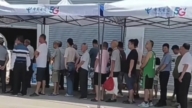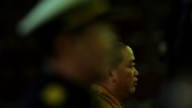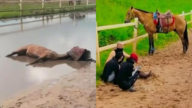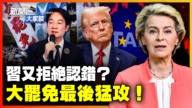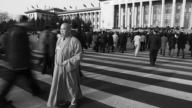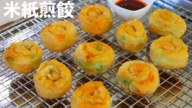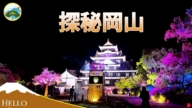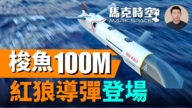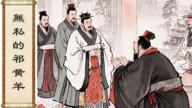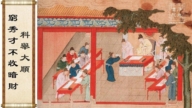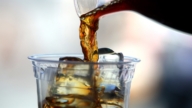【新唐人2011年12月27日讯】“贵州茅台”原本是一般中产阶层喝得起的“国酒”,如今却被炒到2000元人民币一瓶,而且还要进入全球100强奢侈品榜单,早已不是一般民众可望可及的酒饮。有专家指出,这是贪官腐败撑起的天价。
贵州茅台和法国科涅克白兰地、英国苏格兰威士忌被公认为世界三大著名蒸馏名酒,本来是像征中国酿酒技术的“国酒”。然而近几年价格却节节高升,一瓶普通的53度飞天茅台,三、四年前不过五、六百元,如今市场价竟高达两千元左右。
大陆媒体刊登一篇文章《谁是茅台酒价格疯涨的幕后推手》,作者廖小利说,茅台酒已不纯粹是一种酒了,价格往往就不是由简单的市场供求来决定,它是官场上的“人情酒”、“办事酒”,是身份的像征,只要官场的“茅台风”不停,价格再高还是会供不应求。
北京名酒卖场的销售人员透露,买高档白酒的主要是机关、国企等团体客户,他们对白酒价格不敏感,卖多少钱都一样会买。
消费社会学专家、中山大学社会学系教授王宁指出,茅台酒已经是腐败的像征。
王宁:“茅台酒这个品牌,它应该叫腐败奢侈品,购买者主要是公款嘛,或者说我要贿赂官员,我用私款买,但是我可以从官员那边拿到好处。现在一瓶价格2、3千块钱。它都是一个传统品牌,供不应求的情况下,因为它价格高了,普通人喝不起了,然后就变成了奢侈品了。它不是按照正常的奢侈品发展的规律,而是一个跟我们财政体制,公款消费,这个都是有密切关系,是在腐败土壤中长出的一个奢侈品牌。”
由于中国酿酒 以高粱、小麦等谷粮为原料,在国民党执政时,1937年,贵州省政府曾颁布“违背酿酒处罚规则”,禁止在天灾缺粮时期用粮食煮酒、熬糖、米浆刮布。但中共却在三年饥荒期间以上万吨的谷粮酿茅台酒。
博文《茅台是“皇上”》,作者石飞把历史翻开指出,在大陆饿死3000万人的三年饥荒年代,也就是1959年到1961年,茅台酒的产量合计2079吨,国营茅台酒厂实际使用高粱和小麦合计1.13万吨。他说,这一万多吨茅台酒“是从老百姓嘴里掏出来的,是成千上万生命换来的!”
如今,一瓶1959年的“五星”茅台酒却拿出来拍卖103.4万元。石飞写道:“古人云,茅台酒乃提取高粱之‘精’,小麦之‘魂’。殊不知,在那三年里,茅台酒所提取的,可是黎民之‘精’,殍殕之‘魂’呀!”
王宁认为,茅台从国酒走向贿酒,反映了中国的基本问题,就是一党专政的腐败问题。
王宁:“中国最大的问题是基础制度没搞好,这个基础制度就是,公共财政的民主化和公共财政的透明化、阳光化。基础制度没有改革,所有没用,所以中共不走民主化,不走公共财政阳光化,这个东西根本不可能克服。”
北宋文人司马光说:“由俭入奢易,由奢入俭难”,“国酒”茅台要“入奢”进入全球100强奢侈品榜单,以它的价格、地位或许不难,但奢靡成性的中共官员要成为廉洁俭朴的人民公仆,恐怕是难上加难。王宁表示,在公共财政不透明的现况下,公款消费必然无法遏止,茅台价格还会往上抬高。
新唐人记者吴惟、周天综合报导。
Maotai- CCP’s Bribery Wine
Maotai, is originally ‘national wine’ for the middle class,
but is now RMB 2,000 a bottle,
and will enter the top 100 luxury goods list globally,
and no longer for general public consumption.
Some experts pointed out that this is the price propped up
by corrupted officials.
Moutai, French cognac and Scottish whiskey are recognized
as the world three famous distilled liquors.
Maotai is a ‘national drink’ as a symbol of wine-making
technology in China.
But recently, the price of Maotai has been rising continuously.
An bottle of ordinary 53 degrees Feitian Maotai, was about
RMB 500 three years ago, but is about RMB 2,000 currently.
An article Who is the driving force behind the soaring prices of
Maotai, is published on mainland China media.
The author Liao Xiaoli said Maitai is not simply a wine,
and its price is often not simply decided by supply and demand in the market.
It is officially a ‘social wine’, ‘business wine’, and a status symbol.
As long as the official ‘Maotai wind’ does not stop, it will still
be in short supply no matter how high the price is.
Sales staff in wine stores of Beijing said, high-end liquor buyers
are mainly from authorities and state-owned enterprises.
They are not sensitive to the price of liquor,
and will buy them at any price.
Professor Wang Ning, in the Department of Sociology of
Zhongshan University, a consumer sociology expert,
pointed out that, Maotai is a symbol of corruption.
Ning: “Maotai should be called corruption brand.
Buyers are mainly using public funds.
Or I have to bribe officials; I use private money to buy them,
but I can get benefits from the officials.
Now the price is about RMB 2,000 a bottle.
It is a traditional brand.
When in short supply, its price is high, and ordinary people
can not afford it, and so it becomes a luxury.
It is not following the development of the normal luxury products,
but closely related to our financial system and public funds spending.
It is a luxury brand which is closely related to the soil of corruption."
As the Chinese wine use sorghum, wheat and other grains as
raw materials,
during the KMT period, in 1937, Guizhou provincial
government issued Punishment against the Wine Rules,
prohibiting the use of food to cook wine, boil sugar or scrape
cloth with rice slurry in natural disasters and food shortages.
However, the Chinese Communist Party used millions of tons of
grain to brew Maotai during the great famine.
In an article Maotai is the Emperor on micro logging,
the author Shi Fei pointed out that
when 30 million people starved to death in the mainland’s
three-year famine, that is 1959 to 1961, the total output of Maotai was 2,079 tons.
The actual use of sorghum and wheat in state-owned
Maotai plant was in total of 11,300 tons.
He said that the million tons of Maitai “is pulled out
from the mouth of the people, and in exchange for tens of thousands of lives!"
Today, a bottle of 1959 “Five Star" Maitai is put on auction
for RMB 1.034 million.
Shi Fei wrote: “There is an old saying,
Maotai is to extract spirit of sorghum and soul of wheat.
As everyone knows, in those three years, Maotai extracted
the spirits of people and souls of the dead ones."
Wang Ning believes that Maotai changed from
national wine to bribery wine,
it reflects China’s basic problem,
which is one-party dictatorship and corruption.
Ning: “China’s biggest problem is the basis of the system.
The basic system is that the democratization of public finance,
and public finance transparency. Basic system does not reform, so it is useless.
Therefore, if the CCP won’t go through democratization or
public finances transparency, this thing is impossible to overcome."
Literati Sima Guang in Northern Song Dynasty said:
“It is easy to go from the thrift into luxury, but difficult to go from luxury into frugal".
It is not difficult for Maotai to get into the Global 100 list of
luxury goods list.
But it perhaps is difficult for the extravagant Chinese officials
to become honest and frugal servants of the people.
Wang Ning said that in the non-transparent public
Finances situation,
it is impossible to curb the public funds spending,
and Maotai prices will continue to raise up.
NTD reporters Wu Wei and Zhou Tian



